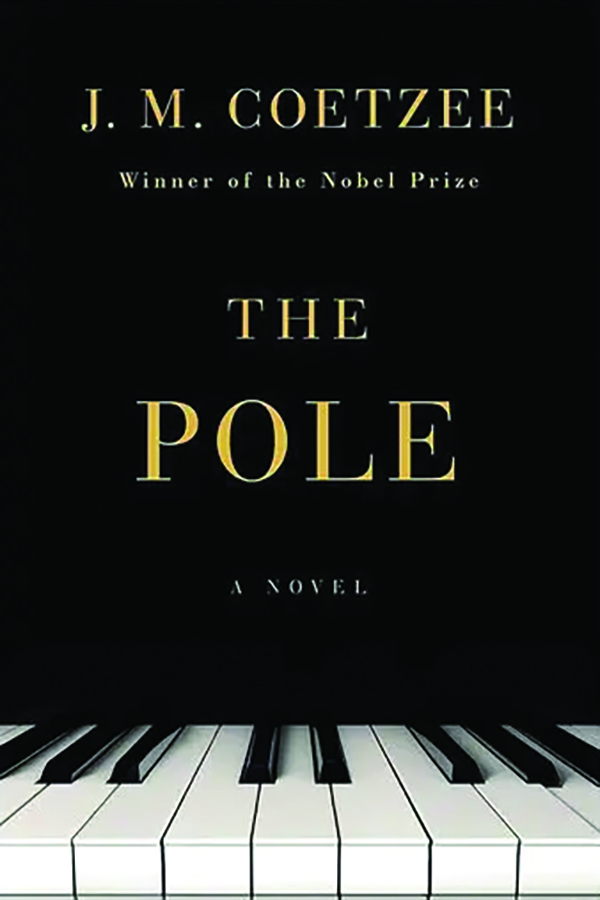
Reviewed: The Pole by J.M. Coetzee
Gustav Jönsson
Just like the opening sentence of Disgrace states that protagonist David Lurie has (to his own mind) “solved the problem of sex rather well” — meaning that he meets a reliable prostitute once a week — J.M. Coetzee’s new novel, The Pole, establishes on the very first page that it is written by a heterosexual male. Its main character, Beatriz, has a “full mouth” and her “low contralto” voice possesses a “suave attractive power.” “Is she sexy?” asks the unnamed narrator. “No, she is not sexy, and certainly not seductive.” But “with a figure like that” she must’ve been quite something in her youth; though now, nearing 50, “she goes in for a certain remoteness” — she doesn’t even swing her hips any longer.

Coetzee has always known how to render sexual frisson. In Age of Iron, for instance, Mrs. Curren admits to herself that the tramp Mr. Vercueil makes her feel a certain unsavory thrill, “as in the excitement of a dog digging for carrion not buried deep enough.” Coetzee treats humans like the reproductive mammals that we are. He is not blind to the fact that, more often than not, the first question men and women ask themselves when they meet is: What would that one be like in bed? Is that objectifying? Is it problematic? No, of course not. But who cares anyway? Everyone is an object to someone. And besides, it is an open secret that sexual objectification can be quite nice. Why, Beatriz asks herself, has she started sleeping with Witold Walczykiewicz? Because it “pleases her to offer herself to his gaze.”
AT THE CORNER OF AIRPORT SPY NOVEL AND GREAT LITERATURE
With those essentials so breezily established, Coetzee moves on to weightier matters: Beatriz’s soul.
Walczykiewicz, the Pole in titular question, is a pianist in his 70s, famous for his interpretation of Chopin. He “looks like a man with messy divorces behind him,” and his “lugubrious” face resembles Max von Sydow’s, though his voice is rather squeakier. None of his hosts in Barcelona can pronounce his surname properly, so “call me Witold” he tells them. Beatriz is the good if rather incurious wife of a fat-walleted businessman. She busies herself with “good works,” which includes sitting on the committee that organizes recitals at Barcelona’s Sala Mompou. She is aware that she is not generally “taken seriously” — what do-gooder ever is? — so she imagines that the Pole must view her as “one of those wealthy nagging women” who have to be humored as “part of the burden he has to bear for the sake of his career as a performer.” But Witold, of course, has been smitten by her since the first moment they met.
To Beatriz’s ears, Witold’s Chopin has no intimacy. It is impersonal, philosophizing, “Chopin as inheritor of Bach.” Witold’s cold Chopin is matched by Coetzee’s rather cold prose. Each sentence is as skeletal as it can while still bearing the load of plot and characterization. Typically, though, Coetzee’s novels have packed scabrous wit along with visions of severe beauty. They have been tightly written yet not without some scopious prose. To my mind, The Pole is more constrained than those earlier works. Declarative sentences pile upon each other, while the paragraphs, often very brief, are numbered. It is as if Coetzee read Wittgenstein’s Tractatus and asked himself if he could write a novel in its style.
Descriptions in The Pole are sparing, to say the least. A little after Witold meets Beatriz in Barcelona, he invites her to go with him on a concert tour in Brazil. She rejects the suggestion, of course. “How,” she wonders, “would he explain her to his Brazilian hosts.” Proprieties, if not fidelity, must be observed. The prose in the paragraph wherein Beatriz tells her husband about the invitation is as naked as though it were from a play: none of the husband’s physical traits are mentioned; he is a mere voice. And when Beatriz goes to the Girona conservatory to see Witold, the city is only sketched in the very briefest of ways: the conservatory is a “faceless building” in the “old part” of town, its corridors are “empty” and the auditorium is “small.” There are no Bellovian flourishes here.
Beatriz professes that she has “no time” for “circumlocutions, word games, veiled meanings” — sentiments shared by Coetzee’s narrator. As Beatriz and Witold promenade in Girona, we’re told: “The river flows softly, a breeze blows, the footpath stretches before them. Details, incidental yet not unimportant.” This must, I’m quite sure, be ironic on Coetzee’s part, because each detail in that sentence is a near or outright tautology: rivers flow, breezes blow, and paths do stretch. The narrator’s nonchalant impatience couldn’t be more explicit than when he writes: “It is a pleasant autumn day. The leaves are turning, et cetera.” While Beatriz reflects that Witold may “just possibly be a joker” hiding behind solemnity, Coetzee’s “et cetera” is most certainly the work of a joker.
Witold and Beatriz move toward their inevitable weekend tryst — in the husband’s childhood home of all places. Yet Beatriz struggles to see Witold for who he really is. It is only belatedly that she shakes her first impression of him as an “old clown” and sees him “in his full selfhood” — which, to be sure, might include him being somewhat of a poseur. But Beatriz is equally sure that her real self is overlooked by Witold. He tells her that, like Dante’s Beatrice, she “gives him peace,” which makes her feel that he has “turned her into a fetish.” “Only connect,” said E.M. Forster, but that’s precisely what Beatriz and Witold never manage. When they talk, their phrases seem like “coins passed back and forth in the dark, in ignorance of what they are worth.” Witold cares for Beatriz, but she thinks of him as nothing more than a fool in love. She belittles his feelings as a way of stifling her own.
This inability to see each other fully, to go beyond everyday pleasantries, to form real human connections, is classic Coetzee. It is impossible for Mrs. Curren in Age of Iron to view the camaraderie of anti-apartheid rebels as anything other than stupid male bravado. Similarly, the nurse in Life & Times of Michael K fails to see Michael’s essential nobility; she takes a benevolent if condescending view of him, thinking of him as nothing more than an innocuous imbecile. And it is only when Witold has died in Krakow, leaving Beatriz a book of poems, that she sees through her own prejudices. She expects the poems to be histrionic laments of how she, his “cruel Spanish mistress,” broke his heart by leaving him, but what she finds is far more tender: she finds a man who, however foolishly or incompletely, tried to reach out to her.
It is because of such sympathetic yet unsentimental moments that, having finished The Pole, I was sure that I’d soon pick it back up again.
CLICK HERE TO READ MORE FROM THE WASHINGTON EXAMINER
Gustav Jönsson is a Swedish freelance writer based in London.
